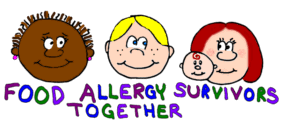Hopefully the following "steps" will encourage you and convince you that, though difficult, your experience is not unique. Others have faced the same difficulties with themselves or a child who has allergies. Modifying your diet will be one of the most difficult things you
do in life, but the results are worth it!
1. Speak about your test results with a certified allergist. Learn all that you can from him/her about your problem and specific circumstance. Ask for a list of recommended readings and any allergy support groups in your area. Also, if the allergies are life-threatening, it is important to get medical supplies immediately (such as a medical bracelet and epinephrine).
2. Remove allergens from your diet. This is the most important step you can follow, other than getting tested by an allergist. Unfortunately, it is also the most difficult due to how much we rely on pre-made foods in today's day and age, and how slowly learning about ingredient labels goes.
3. Connect with other people who have food allergies. They will be able to offer support (recipes, cooking tips, label-reading advice, etc.) when you need it most. Check through your local hospital and allergist for support groups. You can go "virtual" and find online friends if there aren't any in your area. (One place for interaction is this site's mailing list.)
4. Work to find new foods you can eat. Keep a food diary if necessary, to help you realize when you are ingesting foods you should not be.
5. Learn to identify what words in ingredient listings mean. This is one of the most difficult areas of investigation people with food allergies must do. Unfortunately, foods have many alternate names other than what you see on your allergy test results. "Natural flavorings" and "spices" are two words to definitely watch out for on labels, as well as other words that you do not immediately recognize.
6. Call manufacturers to find out what confusing ingredients in their product listings mean. You can also write them e-mails or snail-mails if you find doing that more comfortable.
7. Don't doubt yourself and your diagnosis. Many people begin wondering about their allergies. ("Am I really sick? Maybe the test results were wrong.") A lot of us who have known about our allergies for more than a few weeks have experienced this! Often these feelings crop up when we become anxious to eat our old favorite foods! If you ever doubt your diagnosis, your allergist can speak to you again and perhaps even run more tests. Some people challenge (test) their allergy, but it is very important to speak to your allergist first, especially if the allergy is severe. In addition, some allergists only like their patients to do food challenges in their presence.
8. Don't cheat. You'll only feel sick in the end if you ingest your allergens, and it could even cost you your life. Sampling an old favorite food is simply not worth it. If you miss certain desserts and other foods, find alternatives (see #10).
9. Don't let the disease rule your life. There are so many things in life other than food! If you can't eat out due to allergy concerns, invest in a nice picnic basket and regularly go for picnics with your family or beau. With your friends, go to interactive museums, bowling, art museums, miniature golfing, and other activities that don't involve eating.
10. Create recipes. It's about at this point that many allergics find that there aren't too many pre-made foods they can eat without getting sick. Find cookbooks at your local library, and purchase the ones that you find most helpful and close to your own unique situation. Write down a list of all the foods you greatly miss, and work to find alternatives that taste similarly. Often people with allergies find themselves relying less and less on pre-made items, and more and more on home-made foods.
11. Read research articles about food allergies to keep yourself intune to what is going on. Stick with reliable medical resources! A lot of people at this point in their allergy journey start thinking "No one in the scientific community is doing anything about food allergies!" You'll find that those who say this are usually the ones who do not keep in touch with what is going on in the research field, because there are new things being learned about food allergies! Reading research reports will encourage you that something is being done. But be realistic . . . most studies do not result in a treatment or cure.
12.Work to spread the word. Volunteer to speak at your child's school about food allergies. Take time to tell your friends about your problem and all that it encompasses. Tell people in charge of law-making how difficult it is to read labels. Become involved, and help others understand about this disease which is becoming more and more common.
